
Perspective effects
To the top
3D Glasses effect
Bevel Alpha effect
Bevel Edges effect
Drop Shadow effect
Radial Shadow effect
CC Cylinder effect
CC Environment effect (CS6)
CC Sphere effect
CC Spotlight effect
Third-party effects in this category included with After Effects:
See Third-party plug-ins included with After Effects.
3D Glasses effect
The 3D Glasses effect creates a single 3D image by combining a left and right 3D view. You can use images from 3D programs or stereoscopic
cameras as sources for each view.
For more information about stereoscopic 3D, see Cameras, lights, and points of interest.
The method you use to create the combined images dictates how you view them. For example, you can use 3D Glasses to create an anaglyphic
image, which is an image containing two slightly different perspectives of the same subject that are tinted contrasting colors and superimposed on
each other. To create an anaglyphic image, first combine views and tint each one a different color. Then, use 3D glasses that have either red and
green lenses or red and blue lenses to view the resulting image stereoscopically.
In After Effects CS5, this effect works with 8-bpc color. In After Effects CS5.5 and later, the effect works in 8-bpc, 16-bpc, or 32-bpc color.
Original (left), and with effect applied (right)
Robert Powers provides a video tutorial on the
Slippery Rock NYC website
that shows how to create and use a depth matte and use it as a control
layer for the Displacement Map effect. The result is then used by the 3D Glasses effect to create a stereoscopic image.
To avoid problems with flipped views, keep in mind the following guidelines:
Use the same vertical dimensions for the composition and source images. A one-pixel difference produces the same result as moving the
position one pixel vertically.
Make sure that the Position values for the layer are whole numbers (such as 240 instead of 239.7).
If the left and right view images are interlaced, de-interlace them before using 3D Glasses to avoid field mismatch.
Because 3D Glasses creates interlaced frames, don’t select an interlace option in the Render Settings dialog box.
Ghost effects occur if the luminance values of one color exceed the luminance values of another color to such an extent that you can see the first
color through the wrong lens of anaglyph glasses. For example, an excessive red luminance value becomes visible through the blue lens. If you
adjust the Balance value, test the results on the final output media. If you set the Balance value too high, a reversed shadow may appear.
When you work with red and blue images, the blue color in glasses with red and blue lenses is actually cyan, not blue. Red and cyan are
complementary colors, producing the best separation because they filter each other out more efficiently. When you work with red and green
images, it may appear that the green isn’t as bright as the red. However, viewing the images with red and green lenses produces an even result
because green has a higher luminance value than red.
Left View, Right View
The layer to use as the left or right view. You only need to apply 3D Glasses to one layer in a composition. If you use a
second layer, make sure that the two layers are the same size. The second layer doesn’t need to be visible in the composition.
Convergence Offset (Scene Convergence in CS5.5 and later)
The amount that the two views are offset. Use this control to affect where 3D
Summary of Contents for 12040118 - After Effects Standard
Page 1: ...ADOBE AFTER EFFECTS Help and tutorials...
Page 2: ...What s New...
Page 21: ......
Page 23: ...Legal Notices Online Privacy Policy...
Page 27: ...Workspace and workflow...
Page 29: ...Legal Notices Online Privacy Policy...
Page 36: ......
Page 42: ...Importing from Adobe After Effects Legal Notices Online Privacy Policy...
Page 76: ...Projects and compositions...
Page 92: ...Importing footage...
Page 97: ...Legal Notices Online Privacy Policy...
Page 102: ......
Page 128: ...Layers and properties...
Page 140: ......
Page 171: ...Views and previews...
Page 185: ...Animation and Keyframes...
Page 206: ...Legal Notices Online Privacy Policy...
Page 241: ...Color...
Page 257: ...Legal Notices Online Privacy Policy...
Page 258: ...Drawing painting and paths...
Page 293: ...Text...
Page 314: ......
Page 325: ...Transparency and compositing...
Page 336: ...Legal Notices Online Privacy Policy...
Page 345: ...Effects and animation presets...
Page 380: ...Legal Notices Online Privacy Policy...
Page 513: ...Legal Notices Online Privacy Policy...
Page 514: ...Markers...
Page 518: ......
Page 524: ...Memory storage performance...
Page 544: ...Expressions and automation...
Page 560: ...Legal Notices Online Privacy Policy...
Page 582: ...Rendering and Exporting...
Page 601: ...Legal Notices Online Privacy Policy...
Page 603: ......






























